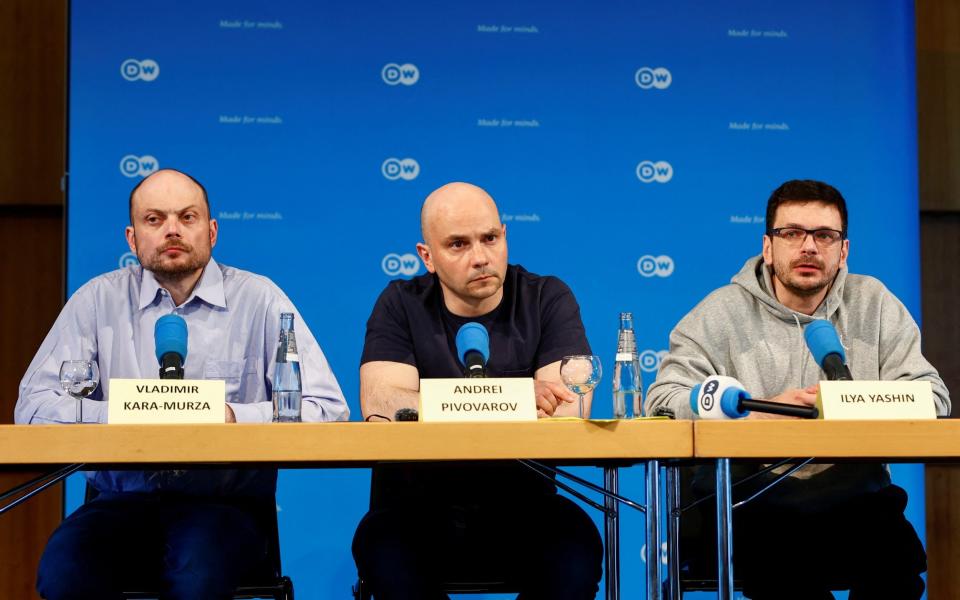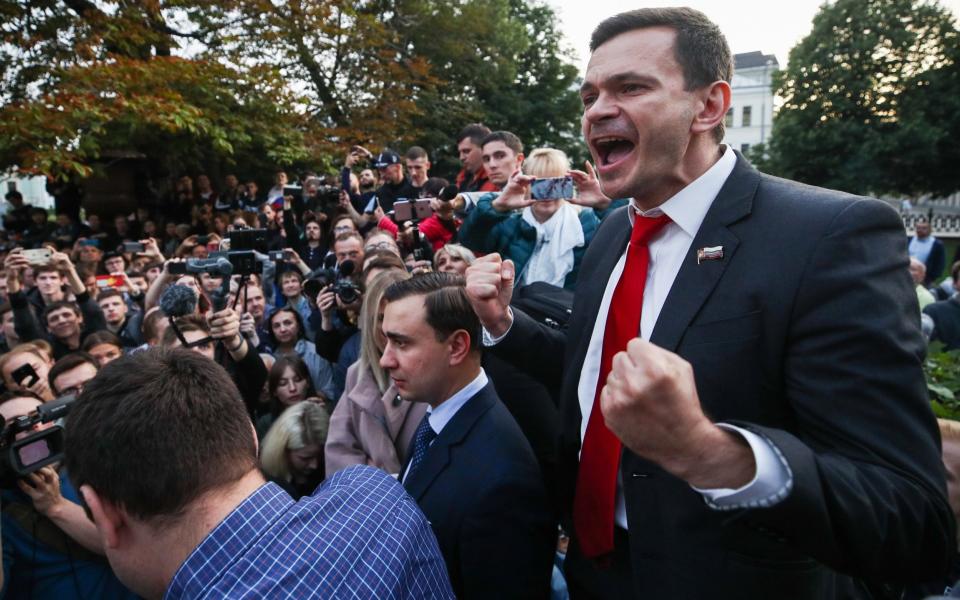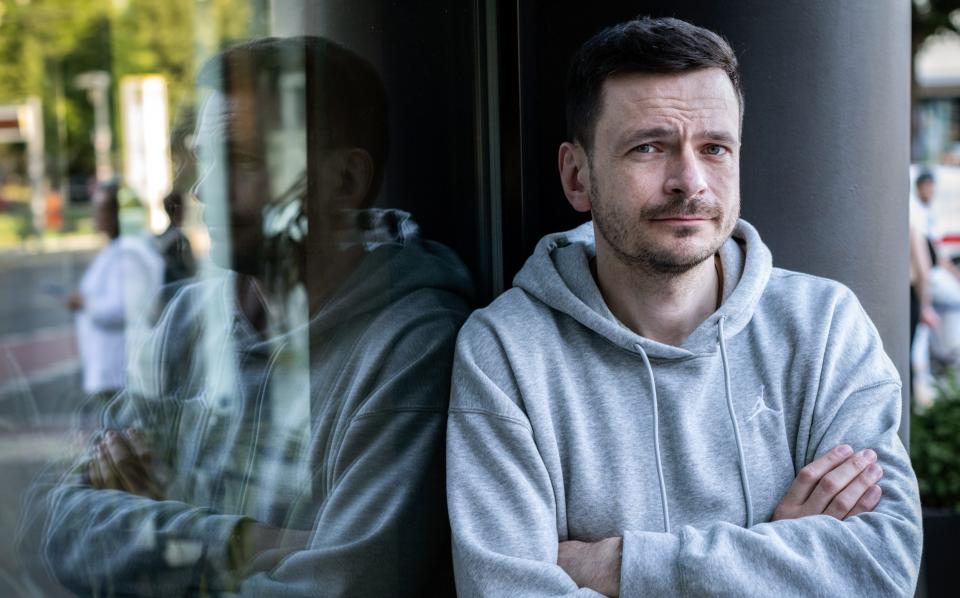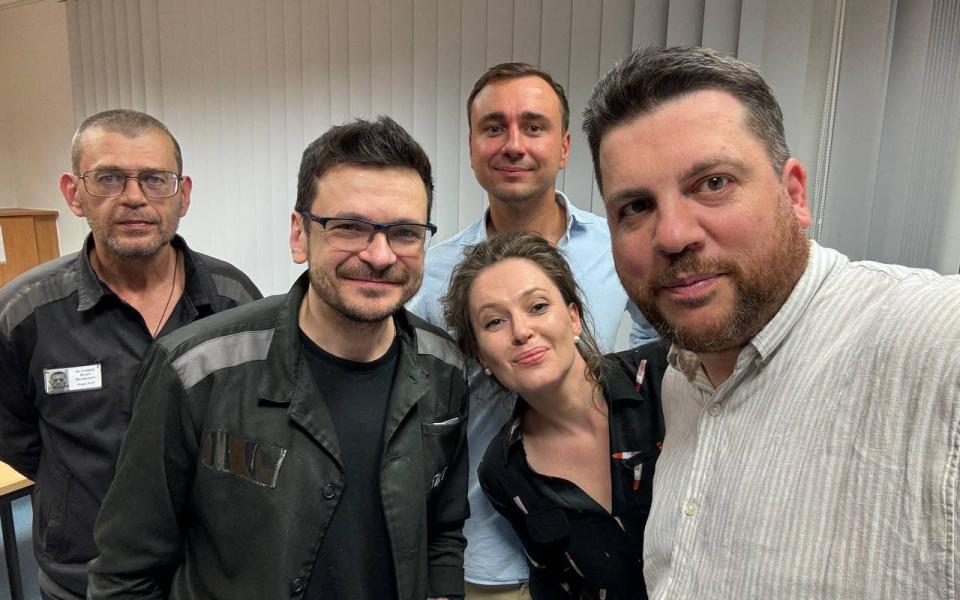After spending two and a half months in solitary confinement, freedom was the last thing on Ilya Yashin’s mind when the prison chief dropped by his dingy cell at the IK-3 prison in western Russia last month. The prison official was ostensibly on a routine round of inmate visits and, while flicking through papers, asked in passing: “By the way, how come you have never written a plea for pardon?”
This is how the Russian government started preparing 16 prisoners, including Ilya Yashin, the Russian opposition politician, and Evan Gershkovich, the Wall Street Journal reporter, ahead of a historic prisoner swap last week.
The rare deal between Russia and the West saw the release of three American citizens and a dozen Russians, from rank-and-file protesters to veteran opposition figures such as Yashin, who kept up his blistering criticism of Vladimir Putin and his war in Ukraine even in prison. The swap took place at Ankara Airport, in Turkey, and after his release, Yashin was sent to a military hospital in Koblenz, western Germany. After being discharged, he took the train to Berlin to meet friends.

Today, when we meet in Berlin, Yashin, 41, dressed in a grey hoodie and brand new snow-white trainers, says “the first thing I thought about when I ended up in Ankara was, get a ticket and fly home to Russia” but FSB officers told him his potential return would put an end to any further prisoner swaps. He admits he has yet to adjust to opposing the Kremlin from exile, a role he had eschewed, saying that fighting for power from outside Russia was futile.
“I don’t know how to be a Russian politician in exile but I will have to learn,” Yashin, who still looks sickly pale, says.
“I’d love to lie in the sun but I can’t do it because I understand my responsibility, and I need to do a certain amount of work right now: people are waiting for the released political prisoners to lean in.”
Yashin was a staunch Kremlin opponent in the early 2000s when global companies were rushing to make lucrative business deals with Moscow and Western leaders hosted Putin for holidays.
Yashin, a trained political scientist, won renown for his daring street protests in the early 2000s, which included climbing on a bridge near the Kremlin with a banner against electoral changes and spearheading a post-election rally that gave rise to the 2011-12 mass protests in Russia.
Yashin, a Moscow native, spoke out against Russia’s shadow war in Ukraine and the annexation of Crimea in 2014 at a time when most Russians enthusiastically cheered the land grab. He was drawn into politics in the early 2000s when the corruption of the Putin regime, if not its murderous nature, was already obvious. After years of getting disqualified from elections, Yashin won a seat on his local Moscow council and was elected as its chairman in 2017, plunging with gusto into issues affecting his local community – many of them somewhat mundane.


When a member of his council was arrested in April 2022, Yashin knew this was a warning shot: “The Kremlin jailed him to scare me off and drive me out of the country.” But, just like Alexei Navalny, who returned to Russia in 2021 after treatment for novichok poisoning, Yashin decided that he would remain in the country. At the time, he had recently been divorced from Vera Musaelyan, his indie singer wife, who had been targeted by authorities for her association with the politician.
Bracing himself for many years behind bars, he got himself up to date on dentist and doctor appointments, as well as putting money aside to fund future food parcels that could be sent to him in prison. Most importantly, he told his ageing parents they should get ready to see him behind bars – causing them “a lot of pain in the process”.
It came as no surprise when, in December 2022, a judge handed down an eight-and-a-half-year prison sentence to the long-time anti-Kremlin activist.


Some 20 months later, while still perky and energetic, Yashin is heavily stooping – a result of sleeping on an excruciatingly tiny camp bed in solitary confinement over the last 10 weeks.
Sitting in a Berlin café, Yashin draws his finger along the wooden slats of a coffee table as he describes the bed, which was latched to the wall each morning after a siren woke him up at 5am. Sitting on it during the daytime was forbidden. Instead, Yashin would spend the rest of the day perched on a tiny stool or pacing the cell, which had just a slit for a window, covered with barbed wire and secured by bars on both sides.
Yashin says it took “inner strength and pillars of support” to stay sane in prison.
“I had two pillars of support: my inner conviction that I stand for the truth – I never doubted it for a second – and my second source of strength was the like-minded people,” he told a rally in Berlin on Wednesday, thanking them for their support.
Letters from supporters – he received more than 30,000 of them – made the biggest contribution to helping him to keep afloat: “I was basking in this sea of love that was helping me so much and I could share it back to you. If you want to stay sane, you need to reach out to others.”
He also cites a book by Viktor E Frankl, the Austrian psychologist, on his time in several Nazi concentration camps as an inspiration for the resilience he mustered, and ability to continue celebrating life, despite the enormously difficult circumstances.
Adjusting to a normal life now is tough, Yashin says. “In my head, I’m still in prison, in my cell,” the politician says, scratching a layer of stubble that has grown out since his first proper visit to a barber on Monday.
“My brain got used to the idea that the prison walls and bars were supposed to be here for more years to come – and then, it all changed in a moment.”


Yashin still wakes up each morning at 5am, and often takes a second to remind himself that he is in a hotel room in Berlin, not in a western Russian prison colony. He saw his parents in Berlin on Monday for the first time since his only prison visit in January.
Yashin, who was expelled from Russia with nothing but an expired Russian ID, is waiting for the German authorities to offer him a legal pathway to stay in the country. He has been so busy meeting supporters since his release that he says he did not have time to think about where he will live and what he will do for money.
Russian friends who live in the city have been taking him out for food and drinks but he admits he is struggling to enjoy it: “It’s like I still can’t believe it’s real.”
Sometimes, when a waiter comes over with a dish in a restaurant, he gets a flashback to “when a jailer throws a bowl of prison grub at you”.
Yashin has spoken out against what he describes as an illegal deportation from his home country, saying the Kremlin broke the law by kicking him out in the prisoner swap. Even Navalny’s tragic death did not shatter his opposition to a life in exile.
“This is a moral choice but it has practical considerations too: both Navalny and I knew perfectly well that a word spoken in Russia, from a defendant’s dock or from behind bars, carries more weight than whatever you say sitting in a Berlin café,” he says.
“Our goal is to fight for the hearts and minds of our compatriots. If you want to win this battle, you need to risk and sacrifice something.”
Then both in their early 20s, Navalny and Yashin met in the early 2000s in the youth wing of the Yabloko liberal democratic party. Both men soon quit the party, and did not work together after that, but publicly cheered each other on. Yashin saw Navalny’s death as a personal loss, writing of the “unbearable pain and horror” he felt at the news.
Yashin says he gained even more respect for his friend after spending his first two weeks in solitary confinement.
“I remember telling my lawyers: I can’t imagine how Navalny spent so much time there. I can’t imagine doing it myself – but then you’re left with no choice and you just have to carry on.”
Navalny died in a jail north of the Arctic Circle in February after spending almost a full year in solitary confinement – the experience that Yashin describes as torture. With no walks, sunlight or human company, and access to books and writing material restricted to an hour and a half a day, all you do is “stare at the wall and go crazy from boredom”.


His journey to freedom started in mid-July when the prison chief at his penal colony in the Smolensk region suggested in passing, on a routine round, that he should try seeking a pardon from Vladimir Putin. After he refused a second nudge, from a senior regional prison official, to sign a pardon plea – “What if you get lucky?” – Yashin was summoned from his cell, led out in the prison yard and shoved into a police van sitting just outside the prison gate. Preparations for the prisoner swap were under way, but the authorities were apparently afraid Yashin would resist so they did not tell the inmate to get any of his belongings.
Yashin, dressed in his prison garb and with a toothbrush and toothpaste that an FSB official fetched from his cell, was in a windowless van heading in an unknown direction. A few hours later, he caught a glimpse through the window of a familiar shopping mall in central Moscow.
The secrecy was maintained when he was taken out of the van at an unknown facility and met once again by the prison chief, who refused to answer his questions. But the facility itself, a pre-trial prison run by the FSB, was a giveaway that a swap was in the works.
A few days later, Yashin deduced he was going to be exchanged for an FSB hit-man convicted in Germany. Wary of expulsion, Yashin penned a letter to the prison chief:
“I reminded him that according to the Russian Constitution, Russian citizens cannot be deported out of the country against their will, and that as a Russian citizen I insist on my right to stay in Russia. I documented the illegal nature of my future expulsion.”
On the morning of Aug 1, three masked FSB officers took the politician from his cell and put him on a bus, where he was soon joined by a dozen other political prisoners, all of whom were driven to a Moscow airport. They were put on a Russian government flight and, three hours later, Yashin, with his five-day stubble, black prison garb and a toothbrush, was met by German officials on arrival in Ankara.
Yashin, whose brand new iPhone keeps beeping with incoming messages, is racked with guilt about those left behind, especially Alexei Gorinov, an elderly councillor from his neighbourhood whose continuing imprisonment he views as a rebuke to him.
While the majority of the prisoners released on Aug 1 are focusing on recuperating away from the public gaze, the day after his release, Yashin immediately hit the ground running. He gave a news conference, almost breaking into tears as he said: “What I want most right now is to go back home.”


On Wednesday, he hosted a rally for anti-war Russians in the Mauerpark, near a preserved section of the Berlin Wall, attracting several thousand people. He has held back-to-back meetings and brainstorming sessions with supporters.
The sudden death of Alexei Navalny in February left a gaping hole in the opposition ranks. Yashin feels that no one can take Navalny’s place right now but he vows to “work hard to fill this gap”.
Last week’s prisoner swap brought about a rare moment of hope and celebration among anti-war Russians inside the country and abroad, and Yashin, who has not had a day off since, is keen to capitalise on this moment.
“People told me this is the first good news they heard in two and a half years,” Yashin says of the audience at this week’s rally in Berlin.
“We need to keep the people’s spirits up so that this new-found enthusiasm doesn’t just dissipate. People were coming up to me, saying: ‘We have a lot of energy, we want to do something and we’re sick of the opposition leaders bickering all the time.’”
Yashin is clear-eyed about the blind spots of the Russian opposition abroad, having followed recent progress from prison.
“I’m collecting ideas, talking to people – running things by them. I have a better idea now of what direction to take and what not to do.”
Source Agencies


